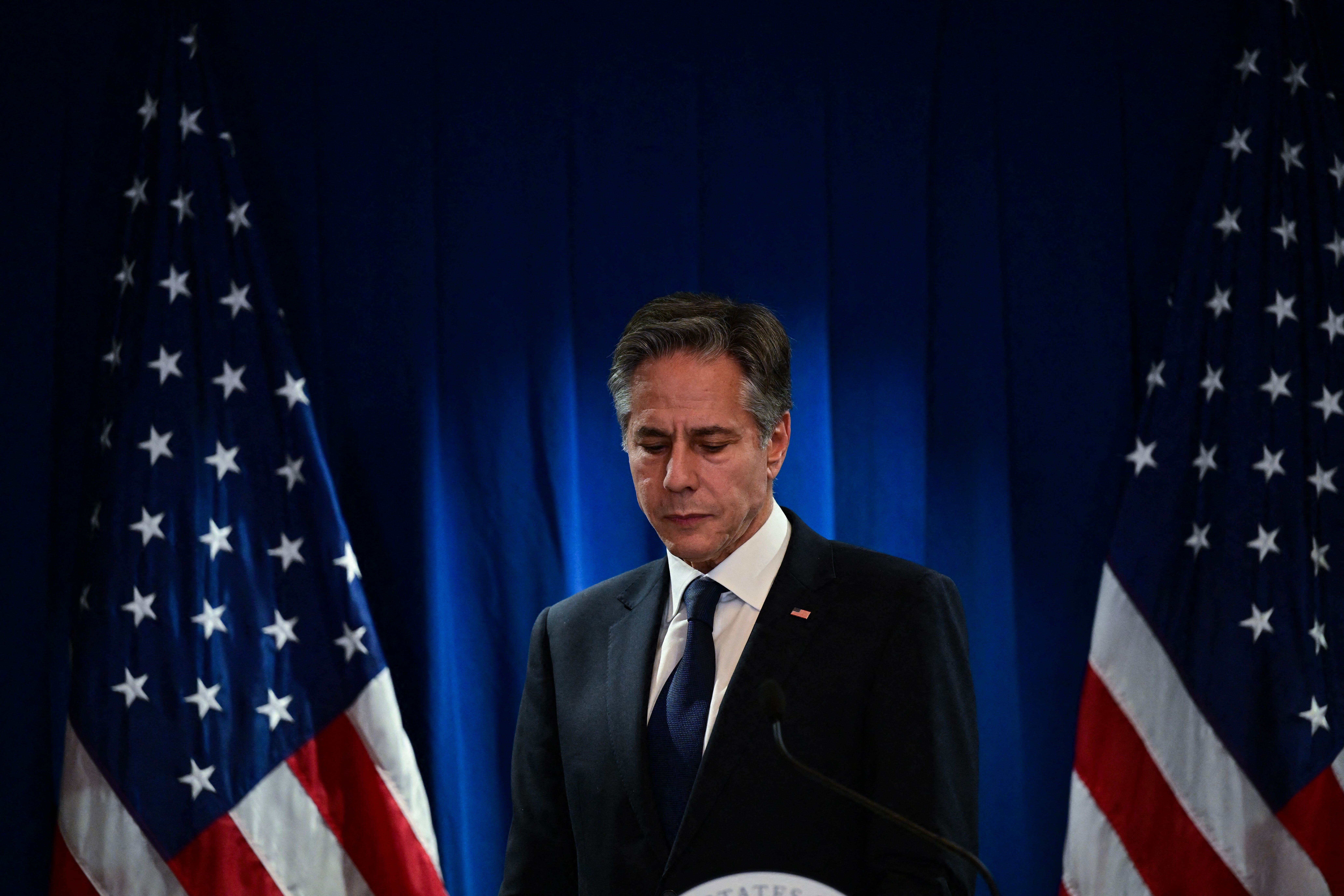A Trump-light, Ukraine-heavy Aspen Security Forum
This year’s national security gathering drew big names, few of whom had real answers.


ASPEN, Colo. — This year’s gathering of foreign policy elites in the Rocky Mountains drew big names, such as Secretary of State Antony Blinken and Ukrainian President Volodymyr Zelenskyy.
But who wasn’t there — and what wasn’t said — was perhaps as significant as the featured speakers and panels at the annual Aspen Security Forum.
There were no big reveals — and no serious solutions are out there for the world’s biggest challenges. Ukraine and China were on everyone’s minds, but the Middle East wasn’t — highlighting how much U.S. national security priorities have changed from the days after Sept. 11, 2001, when terrorism was all anyone talked about.
And everyone did their best not to talk about the ever-approaching elephant in the room: Donald Trump.
Here are a few of our takeaways from four days of group discussions, one-on-one interviews and the occasional ambushing of officials in Aspen’s fancy hotels. (It was hard work, we promise.)
The Middle East is an afterthought
While the Middle East remains tumultuous, there was strikingly little mention of the region during this year’s gathering. Asia — specifically China — received far bigger billing, as did topics like space policy.
During the four-day event, the one panel that was wholly devoted to the Middle East (“Shifting Tides: A New Middle East?”) featured no current government officials. There also appeared to be few representatives of the region in attendance.
Of course, the Middle East came up in other contexts, such as broader discussions on democracy. Overall, however, the lack of emphasis on the region is a sign of how the United States, in particular under President Joe Biden, is prioritizing other global challenges.
Team Biden seems determined to be boring
A parade of Biden administration officials came to Aspen — but they didn’t produce many major headlines.
Blinken said he didn’t think expanding use of land routes would make up for the volume of goods lost after Russia withdrew from the Black Sea grain deal. Jake Sullivan, the national security adviser, said the U.S. took “risks” in its support of Ukraine.
These were incremental advances on what everyone already knew, but didn’t offer any truly new insights into the administration’s thinking on some major problems.
CIA Director Bill Burns made the biggest splash, noting that Russian elites are starting to question Russian President Vladimir Putin’s leadership.
But, generally speaking, the Biden administration’s senior-most officials passed on multiple opportunities to make big statements on U.S.-Israel policy or Ukrainian operations.
The administration’s message discipline and no-drama approach to communications has been a hallmark of the Biden years, and they stayed true to form in the Rockies.
Ukraine right now is a waiting game
The war in Ukraine was a major topic, and top Ukrainian officials, including Zelenskyy and presidential office chief Andriy Yermak, made virtual appearances. U.S. and Ukrainian officials offered plenty of reassurances.
“Ukraine is winning this war, and Russia is losing this war,” U.K. Foreign Secretary James Cleverly said.
But little was said that hadn’t already been said, and there’s no anticipation of any immediate breakthroughs.
Alina Polyakova, head of the Center for European Policy Analysis, said the Ukraine issue felt like it was in a “holding pattern.”
“What I gather from this conversation is that Russia’s war on Ukraine has just now been baked into the global map,” she said.
This is not a happy thing for Ukrainians, who repeatedly said they want to win the war, and quickly. But, as they have before, they requested continued military support from the West, including F-16s and long-range missiles, and said their counteroffensive against Russia was going as planned.
Zelenskyy added that his military was “approaching [the] moment when actions can gain pace.”
Colin Kahl, until recently a top Pentagon official, cautioned against losing hope. The Ukrainians have yet to use most of their combat power in the counteroffensive, he pointed out. Asked to predict how things will look on the ground by year’s end, however, Kahl declined.
“We should all be humble enough not to make predictions about what’s happening in the Ukraine war since it’s not gone according to plan for anybody at any phase,” he said.
It’s time to regulate AI
Massive attention was paid to the promise and peril of artificial intelligence here. U.S. and foreign officials, current and former, said that as of today there’s a good chance of ensuring the powerful, still-developing tool could be used to benefit mankind, not hurt it.
“I have no doubt that it can be turned to good,” Cleverly said during his public conversation.
Linda Thomas-Greenfield, the U.S. ambassador to the United Nations, said the global body should be the one to develop and enforce global rules around the technology.
The potential negative side of AI “has to be regulated, and it is only the U.N. that can regulate it for the world,” the ambassador claimed.
Companies such as Microsoft, a sponsor of the conference, have called on world governments to establish rules around the development and use of AI — though they’d very much like to be involved in crafting what those look like. There was little corporate pushback in Aspen on the idea, though the business community in general is wary of regulating an advancing technology.
Trump is Voldemort
This was the last Aspen Security Forum before the 2024 campaign truly goes nuts, so maybe people just wanted to enjoy normalcy for a while longer. Regardless, it was striking how rarely Donald Trump was mentioned — and how few people wanted to talk about him.
Again and again, POLITICO asked current and former officials in Aspen to talk about how they feel about a potential second Trump presidency. Most did not appreciate the question, practically ducking for cover.
“Oh my God!” said Monica Juma, the Kenyan president’s national security adviser. “No. That’s not for me.”
Others spoke privately to express concern about how Trump’s brand of chaos could undermine the best laid national security plans, including efforts to help Ukraine defeat Russia.
Next year, the forum will be held a few months before the U.S. election. Will Trump, the likely GOP nominee — or Biden, for that matter — be invited to speak? A spokesperson for the forum said to check back closer to next summer.
Either way, maybe people attending will have more to say about what a second Trump term could mean.












